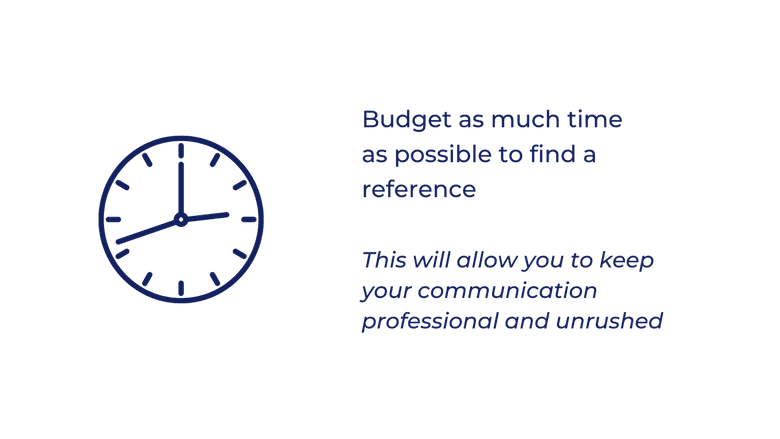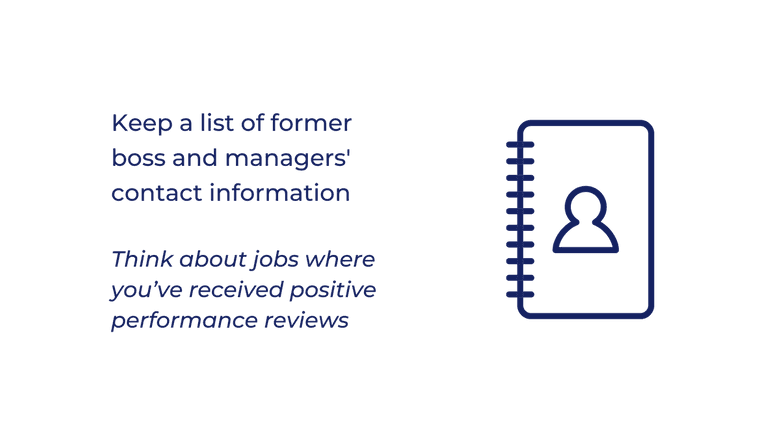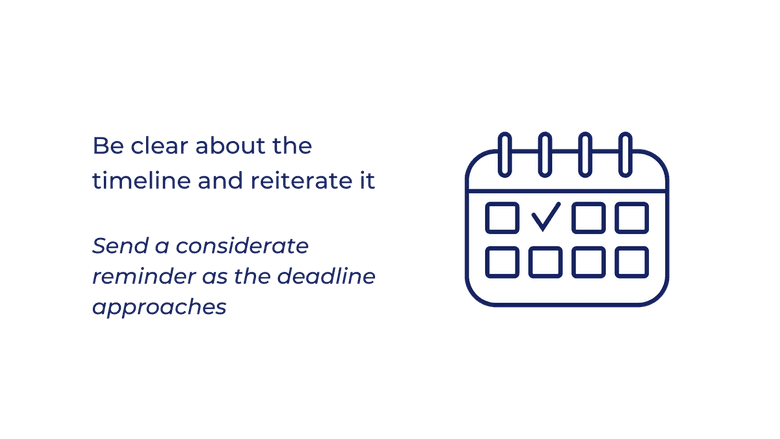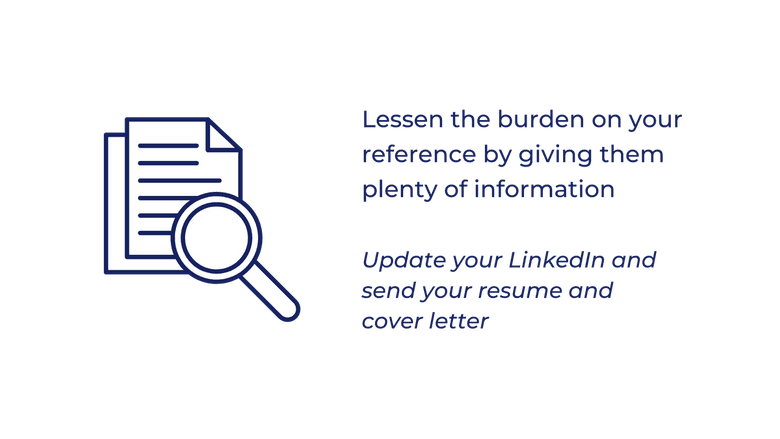How to Secure the Perfect Reference Letter
Proven tips & tricks for landing a great letter of rec
Imagine you find your dream job while on the hunt for a new position. As you’re looking through the job application, you see that part of the hiring process is a reference. You have no idea what it means to have a good reference and the prospect of reaching out to a former employer freaks you out. Don’t worry! While it might seem awkward at first, asking for a letter of recommendation is a common part of the job search. All professionals have been through this process themselves, and most are happy to help, as they were once in your shoes.
This is an important part of landing a new job. Potential employers are curious about how you’ve performed in prior positions you’ve held, and the relationships you’ve had with other bosses or managers. The task of asking for a referral can be daunting, but if done correctly, a job reference is another opportunity to show off your work experience and performance.
So how do you secure the perfect reference? Let’s talk about some tips and tricks for the process.
Start Looking Early

During the application process, be sure to look carefully at a position and determine immediately if it requires a reference. It’s important to give yourself as much time as possible to ask and receive the reference in order to keep your communication professional and unrushed.
Before you reach out to potential references, keep these things in mind:
- Check if the job application asks for a personal reference, a professional reference, or both. This will influence who you reach out to and how you present the requirements.
- Confirm that this is a job you're sure about. It's important to follow through with applying to this job, since you’ll be asking someone for their time to write a reference letter.
Once you're comfortable with the requirements and time commitment, you can begin reaching out.
Be Strategic About WHO You Ask

When you begin this process, start by thinking through all of the prior positions you’ve held. It’s a good idea to keep a list of former bosses and managers along with their contact information for this very purpose. Contemplate who would speak well of your skills and work ethic. Jobs where you’ve received positive performance reviews or accolades, as well as positions where you’ve had a close and positive relationship with your supervisor, are generally good places to look.
Next, consider the time commitment. Think about which potential references would have enough time to write a letter or receive a phone call if asked. If you've recently asked something of one potential reference, it might be best to try others first as not to overload any one person.
If you have multiple former bosses or coworkers that fit into meet these requirements, consider who has relevant knowledge of your skillset or works in a position that is similar to the job for which you’re applying. For example, if you’re interested in product management, ask for a recommendation from someone who plays a central role on a product team.
Be Strategic About HOW You Ask

Once you have your potential reference picked out, you need to make the ask. Figure out what format is most appropriate for contacting the reference you’ve selected. For most professional references, email will be the best way to reach out.
There are a few major components to include in your email:
- An overview of the position including the company name of your potential employer, the job title, and a brief job description if appropriate.
- An explanation of why you value this person’s opinion, and why you’re reaching out to them for this job in particular.
- A brief overview of your current employment and any other major educational or professional updates since you were last in formal contact with your potential reference.
- An offer to follow up with more information (described more in depth below) if they’re available to serve as a reference.
There are also a couple of logistical things to add, including the date you need the reference by and the form of contact the recruiter wants to use. If the potential reference accepts, you know they’re comfortable being communicated with in that manner.
Make sure that the language you use in your email is professional, even if your relationship was casual when you were working for the potential reference. It is always best to air on the side of formality when communicating with professional contacts during the job search process. If you are in the process of applying to multiple jobs, it could be advantageous to keep an email template for this request. Keep the basics outlined above and fill in the rest with information specific to the position.
Establish a Clear Timeline

One of the most important parts of this process is establishing a clear timeline. Even though you’ve already included a deadline in your initial ask, it is important to go over those details again. If the reference is in a written format, be sure to respectfully make clear when the letter is needed by. If the recruiter is going to be calling, confirm that your reference will be available by phone (i.e. not away on vacation) during the weeks when the recruiter might reach out.
Why is reiterating the timeline so important? Your reference might forget, or they might find a timing issue on their side upon closer look. To avoid this as much as possible, send a reminder as the deadline approaches, but be considerate about the way you phrase it. If you’re worried about your reference’s ability to adhere to a certain deadline, it might be best to ask a different person for the recommendation.
Make It Easy to Complete

A reference request can seem burdensome if there is not clear communication about what is needed from the referrer. Once they have accepted the request, there are many things you can do to lessen the burden on your referrer and strengthen your letter at the same time.
Be sure to give ample information about the format of the reference. If the hiring manager or recruiter will be calling, it is helpful to give your reference their phone number so they know what to be on the lookout for. If the reference is written, provide clarity on the length, content and formality the recruiter might be looking for.
Make sure your professional references have a thorough understanding of your experiences and skills. Update your LinkedIn and send over your cover letter and current resume, in case they need some reminders about your background. Additionally, consider sending the job description for even more context.
It’s helpful to provide the company name of your potential employer again so that your reference can research the company if they wish. Offer to give them a phone call, or more information over email if they have any questions.
Follow Up

Once your reference has written your recommendation, reach out and thank them for their help. They’ve put in a lot of effort to help you in your job search, so be sure to show your appreciation. At the very least, this is a show of professional courtesy and respect. You want your former boss or coworker to think highly of you. Or, if you feel comfortable, use this follow up as an opportunity to suggest keeping in touch. If you receive the position, be sure to reach out again and extend additional thanks to your recommender.
Although it might be intimidating at first, asking for a reference letter is very do-able. With some time, preparation, and intentionality, you can significantly add to your application and impress potential employers. Best case scenario, a good reference can maximize your chances of being hired by showing off your skills and abilities. If you are respectful and professional about your request, the worst thing that can come out of the process is a “no” and some more networking experience.
Now that you know how to ask for a reference, you're one step closer to your dream job!
The information provided herein is for general informational purposes only and is not intended to provide tax, legal, or investment advice and should not be construed as an offer to sell, a solicitation of an offer to buy, or a recommendation of any security by Candor, its employees and affiliates, or any third-party. Any expressions of opinion or assumptions are for illustrative purposes only and are subject to change without notice. Past performance is not a guarantee of future results and the opinions presented herein should not be viewed as an indicator of future performance. Investing in securities involves risk. Loss of principal is possible.
Third-party data has been obtained from sources we believe to be reliable; however, its accuracy, completeness, or reliability cannot be guaranteed. Candor does not receive compensation to promote or discuss any particular Company; however, Candor, its employees and affiliates, and/or its clients may hold positions in securities of the Companies discussed.
